 Janus Head Janus Head
11.1&2

Travels Inside the Archive
Robert Gibbons
Edge of Maine Editions

Beyond Time
New & Selected Work
1977 - 2007
Robert Gibbons
 The Age of Briggs & Stratton The Age of Briggs & Stratton
Peter Culley
|

Thomas Merton photography
.....................................................
I am aware of the need for constant self-revision and growth, leaving behind the renunciations of yesterday and yet in continuity with all my yesterdays. For to cling to the past is to lose one's continuity with the past, since this means clinging to what is no longer there. My ideas are always changing, always moving around one center, and I am always seeing that center, and I am always seeing that center from somewhere else. Hence, I will always be accused of inconsistency. But I will no longer be there to hear the accusation.
- Thomas Merton

Thomas Merton
January 31, 1915 - December 10, 1968
I have nothing left to translate
Into the figures of night
Or the pale geometry
Of the fire-birds.
If I once had a wagon of lights to ride in
The axle is broken
The horses are shot.
-
Thomas Merton
_______________________

Michal Cala
_______________________
The Library is on Fire
Wood as Cultural Signifier
M.W. Blackburn
The tasks of wood seem endless, and as the substance takes form after form, its cumulative force engenders a collective hallucination: it begins to seem that we, as a species, are the embodiment of industriousness, a people of action who make and make and make, rather than a sentient life force that values stillness and solitude (which is what the library requires and what the woods permit). "A dictionary begins when it no longer gives the meaning of words, but their tasks," states Georges Bataille in his one paragraph essay/entry "Formless" from Visions of Excess.(....)
But what do we do with this information-- that the nature of objects can be as abstract and liquid as words? When the primacy of objects -- the authority of things -- is destabilized, what changes in our daily reality? Is there a renewed sense of agency -- that we triumph despite a constant flux -- or is there a deeper dread, that survival is contingent on an ever-shifting utilization of material accident? Seventy odd years ago, when the code became prophetic and the forest burned, was it fear of the body terrorized that made Char want to claim the primacy of words, alone? I imagine that objects -- shrapnel, corpses, shelters, and bodies -- are so psychologically freighted in battle -- that it feels necessary to sublimate one's attachment to these soft vulnerable carapaces -- to deny all objects and laud the word. This way in which Char -- in a kind of projected grief -- created a beautiful and false pillar of abstraction to cling to reminds me of the obverse -- twin and twisting tree houses built of driftwood on the coast of California. A father built the tree houses when his son died at sea. They towered up fragile -- a careening and rickety wood helix -- but they did not protect and could not preserve anything that had been lost, flesh or word. The world still existed beyond the tree house and the coast -- furious and charged, shaking....(more)
_______________________

Under the pavement in Trafalgar
Jean Morris
tasting rhubarb
_______________________
On Transience
Sigmund Freud
Translation by James Strachey
Mourning over the loss of something that we have loved or admired seems so natural to the layman that he regards it as self-evident. But to psychologists mourning is a great riddle, one of those phenomena which cannot themselves be explained but to which other obscurities can be traced back. We possess, as it seems, a certain amount of capacity for love—what we call libido—which in the earliest stages of development is directed towards our own ego. Later, though still at a very early time, this libido is diverted from the ego on to objects, which are thus in a sense taken into our ego. If the objects are destroyed or if they are lost to us, our capacity for love (our libido) is once more liberated; and it can then either take other objects instead or can temporarily return to the ego. But why it is that this detachment of libido from its objects should be such a painful process is a mystery to us and we have not hitherto been able to frame any hypothesis to account for it. We only see that libido clings to its objects and will not renounce those that are lost even when a substitute lies ready to hand. Such then is mourning.
My conversation with the poet took place in the summer before the war. A year later the war broke out and robbed the world of its beauties. It destroyed not only the beauty of the countrysides through which it passed and the works of art which it met with on its path but it also shattered our pride in the achievements of our civilization, our admiration for many philosophers and artists and our hopes of a final triumph over the differences between nations and races. It tarnished the lofty impartiality of our science, it revealed our instincts in all their nakedness and let loose the evil spirits within us which we thought had been tamed for ever by centuries of continuous education by the noblest minds. It made our country small again and made the rest of the world far remote. It robbed us of very much that we had loved, and showed us how ephemeral were many things that we had regarded as changeless.
We cannot be surprised that our libido, thus bereft of so many of its objects, has clung with all the greater intensity to what is left to us....(more)
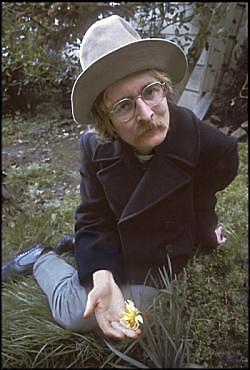
Richard Brautigan
(January 30, 1935 – ca. September 14, 1984)
photo by Erik Weber
1967
All Watched Over by Machines of Loving Grace
Richard Brautigan
I like to think (and
the sooner the better!)
of a cybernetic meadow
where mammels and computers
live together in mutually
programming harmony
like pure water
touching clear sky.
I like to think
(right now, please!)
of a cybernetic forest
filled with pines and electronics
where deer stroll peacefully
past computers
as if they were flowers
with spinning blossoms.
I like to think
(it has to be!)
of a cybernetic ecology
where we are free of our labors
and joined back to nature,
returned to our mammal
brothers and sisters,
and all watched over
by machines of loving grace.

Trois Marassas/Three Graces
George Valris
The Haitian Spirit
Indigo Arts Gallery
_______________________
This is not a natural disaster story
Informant38
... it's really about getting rid of poverty while keeping the system that creates it, that depends on the mechanisms that create poverty, keeping what's really wrong because it's thrilling when you're on top, it's too powerful to let go of, so we just have to find a way to keep the swine in power and the system churning toward apotheosis.
It's like being a cocaine addict, wanting to be one and remaining one, because the exhilaration is impossible to turn down, but eating better and getting enough rest. You know, health and stuff.
Poverty's a symptom says Mr. Brooks, and then won't say but implies it's a disease of ignorance and small selfish minds unable to make the change toward participation in Brooks and Co's bravest of the brave newest of the new, worlds.
The actual disease isn't as readily described, unfortunately.
That Mr. Brooks can't find it in himself to once mention Toussaint L'Ouverture is most telling, or should be. Because that's what's wrong in Haiti.
What happened to Toussaint L'Ouverture is what's wrong in Haiti, and here, and everywhere in the capitalist world where poverty's endemic. But seeing that accurately and describing that accurately and demanding it be addressed in substance and at its roots is...is....well it's a demand for socialism is what it is and no way we're getting Mr. David Brooks to talk about socialism with anything but a sneer of disdain. Because it doesn't work and you get loudmouth tinpot dictators like that creep down there whats-his-name uh Chavez.
Plus you could talk about the international drug trade, in Haiti, using Haiti like they use Ghana, which trade most of the uninformed still think of as run by swarthy Italians and equally swarthy sort of Colombian/Mexicans.
Which impression while understandable is now nothing but purest fiction....(more)
_______________________

Wilson Bigaud
b. 29 January 1931
Port-au-Prince
1 2 3
_______________________
Hegel and Haiti [pdf]
Susan Buck-Morss
Critical Inquiry, Vol. 26, No. 4. (Summer, 2000)
By the eighteenth century, slavery had become the root metaphor of Western political philosophy, connoting everything that was evil about power re1ations.l Freedom, its conceptual antithesis, was considered by Enlightenment thinkers as the highest and universal political value. Yet this political metaphor began to take root at precisely the time that the economic practice of slavery-the systematic, highly sophisticated capitalist enslavement of non-Europeans as a labor force in the colonies-was increasing quantitatively and intensifying qualitatively to the point that by the mid-eighteenth century it came to underwrite the entire economic system of the West, paradoxically facilitating the global spread of the very Enlightenment ideals that were in such fundamental contradiction to it.
This glaring discrepancy between thought and practice marked the period of the transformation of global capitalism from its mercantile to its protoindustrial form. One would think that, surely, no rational, "enlightened" thinker could have failed to notice. But such was not the case. The exploitation of millions of colonial slave laborers was accepted as part of the given world by the very thinkers who proclaimed freedom to be man's natural state and inalienable right. Even when theoretical claims of freedom were transformed into revolutionary action on the political stage, it was possible for the slave-driven colonial economy that functioned behind the scenes to be kept in darkness.
If this paradox did not seem to trouble the logical consciousness of contemporaries, it is perhaps more surprising that present-day writers, while fully cognizant of the facts, are still capable of constructing Western histories as coherent narratives of human freedom. The reasons do not need to be intentional. When national histories are conceived as selfcontained, or when the separate aspects of history are treated in disciplinary isolation, counterevidence is pushed to the margins as irrelevant. The greater the specialization of knowledge, the more advanced the level of research, the longer and more venerable the scholarly tradition, the easier it is to ignore discordant facts. It should be noted that specialization and isolation are also a danger for those new disciplines such as African American studies, or new fields such as diaspora studies, that were established precisely to remedy the situation. Disciplinary boundaries allow counterevidence to belong to someone else's story. After all, a scholar cannot be an expert in everything. Reasonable enough. But such arguments are a way of avoiding the awkward truth that if certain constellations of facts are able to enter scholarly consciousness deeply enough, they threaten not only the venerable narratives, but also the entrenched academic disciplines that (re)produce them. For example, there is no place in the university in which the particular research constellation "Hegel and Haiti" would have a home. That is the topic which concerns me here, and I am going to take a circuitous route to reach it. My apologies, but this apparent detour is the argument itself....(more)
via Box 3, Spool 5
_______________________
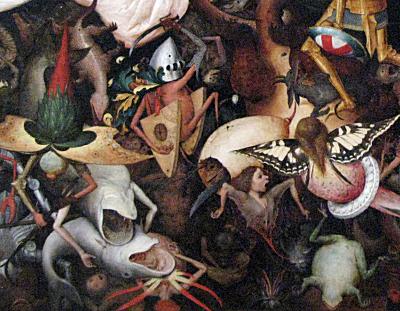
The Fall of the Rebel Angels
Pieter Bruegel
Bruegel’s Presence
Lebbeus Woods Umberto Eco, the theorist, novelist, and Medievalist, has claimed that globalization and the sometimes abrasive melding of peoples and cultures in our time have not yielded a new Classical age in the Enlightenment mode, but rather a new Medieval age, negotiating between chaos and order, seeking a complex, ever-changing balance of competing forces. The emergence of the internet, with its anti-hierarchical form, certainly bears out this point of view. Pieter Bruegel's paintings are more alive today than at any time since he made them. In many ways, he was one of us.
_______________________
Transmigration of the fool
Roger Gathman
Limited, Inc.
The Money. The narcissism. The Artificial human.
All these themes, and so little time to go through the woods. ...(more)
_______________________
Open Veins Of Latin America: Five Centuries Of The Pillage 0f A Continent
Eduardo Galeano
Translated by Cedric Belfrage
aaaarg - free reg. req.
_______________________

Howard Zinn
Aug. 24, 1922 – Jan. 27, 2010
_______________________
Returning to the Closet
(on Raymond Federman)
Douglas Messerli
Sibila
Now, finally, Ray has been removed from that closet, that coffin-like precursor of death, forever. He has joined the dead by giving up his voice. For us still here, still trapped in each of our personal closets, so to speak, we can only, like "the old man," become lonely and forlorn. We miss that larger than life wise fool so very desperately. And, gathering today, we need to speak of our great emptiness, to share it with others. As Ray himself wrote some time before his death, however, in the humorous and profound short essay, "Reflections on Ways to Improve Death":
The fact that Federman cannot say I am dead. The fact of being unable to speak one's death is the supreme category which abolishes all the others. It is the ultimate category, the category of the unspeakability of death. Whether one dies in bed, dies in one's books, dies with one's boots on, dies on the vine, dies in harness, dies prematurely or in one's sleep, dies in a gas chamber, dies while making love to one's lover, when all is done and said, that is the category of death that has reached total improvement because it can no longer be spoken.
Language vanishes into death, and death vanishes into silence. Or is it, vanishes into language, and language into silence? ...(more)
_______________________

photo - mw
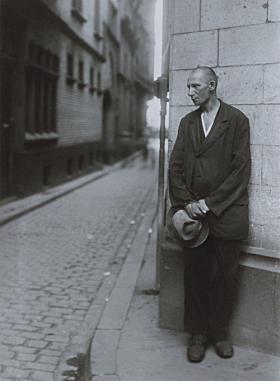
Jobless
1928
August Sander
1876 - 1964
_______________________
August Sander - A Profile of the People
Hans-Michael Koetzle
In 1910, August Sander began a systematic attempt to portray and typologize his fellow countrymen. The project, undertaken wholly at his own initiative and expense, found support only among his painter friends in the Rhineland area of Germany. His book Antlitz der Zeit was outlawed and partially destroyed by the Nazis in 1936, but Sander's ambitious undertaking today ranks among the most outstanding contributions to the New Objectivity in photography....(more)

Sander's Studio
Cologne
drying corner and enlarger
1930 - 1942
_______________________
Threadbare
Eirik Gumeny
Bananafish
(....)Ichabod cannot see the dragons circling overhead, with scales and fangs and eyes burning crimson. Breathing a fire that could scorch the sun. Ichabod does not see the eagles die.
"This great nation is looking to you for stability, looking to you for hope. You are the ones to return us to our former glory, free from doubt and internal conflict. The ones who will run for public office, take history-making strides in the private sector, the ones who will inherit our country."
Ichabod pollutes the air with optimism and nostalgia and a complete misunderstanding of this life.
"You are the ones to make whole the shattered pieces of our American society. You are the ones to pick up where we left off, to take the steps we cannot."
We are choking on the dried up, burnt out memories of something else, something better.
"You are our pride. Our future."
The liar, the rock star, and the siren. We are Maggie's garden, with heads bowed low.
"I can think of no class, no students, holding more promise than you."
There is a thunderclap of applause, the ground shivering from the sound. We are knee-deep in twitching dust, an endless sky of black clouds trembles before us.
...(more)
Bananafish - Inaugural Issuevia NewPages_______________________

Gypsy
August Sander
c. 1930
_______________________
The humanitarian myth
Richard Seymour
In effect, the U.S. has staged an invasion of Haiti, under the pretext of providing security for humanitarian aid, and in doing so has prevented the delivery of humanitarian aid. With Haitians in a desperate condition, and the UN-supervised government in dire straits, Washington has sent the International Monetary Fund to offer a $100 million loan, on the proviso that public wages be frozen.
The "security" operation, meanwhile, proceeds apace. As well as U.S. troops, thousands more UN police have been sent to Haiti. Already, UN troops, alongside the Haitian police, have been responsible for several killings, as they have opened fire on starving earthquake survivors who dared to try to retrieve the means of survival from shops and other locations. The US has also insisted that the Haitian government pass an emergency decree authorizing curfews and martial law. Secretary of State Hillary Clinton said that the decree "would give the government an enormous amount of authority, which in practice they would delegate to us."
This process has been facilitated by a flood of alarmist and often racist reporting about "mobs," "looters" and "gangs" causing a "security crisis." A "security crisis" validates a repressive response....(more)
_______________________
Haiti in Ink and Tears: A Literary Sampler
Hold on, it can't be yesterday. Yesterday we weren't open because the mother of one of the girls died. Days and years get scrambled in my mind. I remember everything all at the same time. Us old folks, can we ever mix up places and happenings and memories! We live in a long night with no need to see things in detail since words and actions are constantly melting into elusive colors and sounds. Our night stretches out, unfolding in vagueness, a vast and melancholy mockery of a place outside all chronological constraint, where each fact is a particle on the move. Old people have a special way of celebrating how matter goes on forever, through the baroque art of do-it-yourself, every wound closing and opening again and again. The pathos of capital punishments and last-minute reprieves having lost both charm and glory, the honesty of old age turns out to be the lucid confession of relative values. So, monsieur, perhaps she didn't arrive at that precise moment, but years earlier, during the reign of the great dictator Deceased Forever-Immortal, during the youth of the Prophet, or on that eventful day itself, but a bit earlier or later, when the street already smelled of charred flesh, when the bodies, metals, mud, fire, plastic, and death mingled in a harsh, moist odor of filth, amalgam, and heartbreak.
-
Lyonel Trouillot , "Street of Lost Footsteps" (University of Nebraska Press, 2003).
_______________________
A City's Death by Fire
After that hot gospeller has levelled all but the churched sky,
I wrote the tale by tallow of a city's death by fire;
Under a candle's eye, that smoked in tears, I
Wanted to tell, in more than wax, of faiths that were snapped like wire.
All day I walked abroad among the rubbled tales,
Shocked at each wall that stood on the street like a liar;
Loud was the bird-rocked sky, and all the clouds were bales
Torn open by looting, and white, in spite of the fire.
By the smoking sea, where Christ walked, I asked, why
Should a man wax tears, when his wooden world fails?
In town, leaves were paper, but the hills were a flock of faiths;
To a boy who walked all day, each leaf was a green breath
Rebuilding a love I thought was dead as nails,
Blessing the death and the baptism by fire.
-
- Derek Walcott
_______________________

Circus Caravan
August Sander
1929
_______________________
The Library Of Babel
Lourdes Vázquez
sibila
The production of artist’s books in the twentieth century is directly related to the political and avant-garde movements. Latin American writers who were part of these movements returned to the exotic beauty of the indigenous codices, the simple forms of medieval literatura de cordel--chapbooks and explore the non-conformist typography of concrete poetry, giving a new vision to book design. Like their counterparts in Europe and the United States, artists and graphic designers experimented with typography, page design and binding. They immersed themselves in mastering techniques such as engraving, woodcut, photography, collage, frottage, photomontage and digital design.
Such collaborations between artists, writers and presses are reflected in Jorge Luis Borges's “The Library of Babel.” Aside from his fame as a writer, Borges viewed himself as a librarian. In his story, Borges contemplates a new definition of the library:
“The universe (which others called The Library), is composed of an indefinite, perhaps infinite number of hexagonal galleries. In the center of each gallery is a ventilation shaft, bounded by a low railing. From any hexagon one can see the floors above and below--one after another, endlessly. The arrangement of the galleries is always the same: Twenty bookshelves, five to each side, line four of the hexagon's six sides; the height of the bookshelves, floor to ceiling, is hardly greater than the height of a normal librarian."
In Borges library there is a mirror, one single mirror, "which faithfully duplicates appearances." One could view this universe with a certain light--"certain spherical fruits" called bulbs, which bathes the books. The universe of the independent presses is composed of indefinite hexagonal galleries that one could walk, such as the history of the publishing and printing, the history of the book, and the history of calligraphy and paper. The history of poetry, art, music, theater, performance and happening are ventilation shafts giving oxygen to these galleries, keeping a perpetual balance between symbol and image. The mirror and light are the many forms that these books assume in the mind and eye of the reader. Breaking free of a restrictive definition, the book become surprise boxes or in the language of Borges "enigmatic books" in the form of a stack of loose-leaf pages, printed, bound, stitched, with mobile artifacts inserted. They can be a portfolio, a codice, or a cylinder, an envelope tied with ribbons or cord, collected perhaps in a box of wood or metal....(more)
_______________________
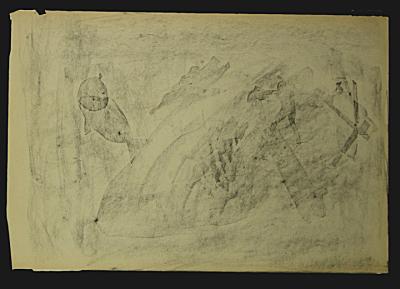
Henri Michaux
c. 1942-44
Frottage
Miguel Abreu Gallery
via
 Lounge Painting # 2,
Gila Bend, Arizona
Pictures from the Surface of the Earth
The Photography of Wim Wenders
_______________________
Impossible Stories
Wim Wenders
translated by Michael Hofmann
free reg. req.
from The Logic of Images: Essays and Conversations
For myself - and hence my problems with story - I incline to believe in chaos, in the inexplicable complexity of the events around me. Basically, I think that individual situations are unrelated to each other, and my experience seems to consist entirely of individual situations; I've never yet been involved in a story with a beginning, middle and end. For someone who tells stories this is positively sinful, but I must confess that I have yet to experience a story. I think stories are actually lies. But they are incredibly important to our survival. ... By producing coherence, stories make life bearable and combat fears.
_______________________
CONTE
Brian Campbell
"Once upon a time," he said.
"Once," he said.
"Upon," he said.
"A time," he said.
"Once."
Why once? Why just once, among at least two hundred billion humans living or dead, sixty-five hundred quadrillion organisms, one thousand decillion octogintillion septenseptuagintillion to the power of googolplexplexplexplexplexplexplex of stars, gas giants, comets, meteors and whirling cold clumps of earth? Why once?
"Upon."
This upon. Upon a time. How upon? A time, especially a time? How can anyone be upon a time?
Why not within? Without? Inside? Out? Under, over, in front of, back of, beside, above, beyond?
"Twice beneath a time."
"Thrice beyond a time."
"One hundred thousand three hundred and forty-six nonagintillion duocentillion sextendecillion times without…"
…a time? Why not space? Space-time time-space space-time times time-space?
Why a? Why not the? Why not beyond above beneath in back of in front of a or the? Why not between a and the?
"Thrice throughout the spaces, two dwarfs and a bear…"
"Forty-nine times within outside a space-time discontinuum, this raven-eyed witch…"
...(more)
Sky of Ink
Montreal poet Brian Campbell blogs at Out of the Woodwork
There is an interview with him at Poetry Quebec.
_______________________

Virginia Woolf
January 25, 1882 - March 28, 1941
photo - Gisèle Freund, 1939
Virginia Woolf in the Pay of Booksellers
commerce, privacy, professionalism, Orlando.
Patrick Collier
Twentieth Century Literature, Winter, 2002
Virginia Woolf's Orlando (1928) stages one of the central conflicts of modernism. It puts into play the opposing impulses of the longing for cultural centrality--"as large and miscellaneous an audience as possible" --and the desire to write a radical language that stretches or subverts the boundaries of signification and whose inaccessibility to most readers can be claimed as a mark of its authenticity. Orlando raises the tension between the urge to decry the institutions of the literary marketplace and the need to master and manipulate those institutions, for prestige and cultural capital if not for popularity per se--between the writer's wish to be heard and her desire to remain true to her artistic ambition, expressed in Orlando as the wish to refine language into an instrument so efficient, capable of conveying such a dense load of meaning, that it can be understood only by the writer herself and a few select others. This tension is complicated by the contours of the literary marketplace, in which the press and the publishing industry mediate between reader and writer, threatening both the writer's freedom to hew to her own aims and her ability to reach her audience (should she decide that doing so is worthwhile)....(more)
_______________________
Song of the Andoumboulou: 50
Nathaniel Mackey
(....)
We had
Come thru there before we were
told. Others claiming to be us had
come thru... The ubiquitous two lay
bound in cloth come down from on
high,
hoping it so, twist of their raiment
steep
integument, emollient feel for what
might not have been there. Head in the
clouds he'd have said of himself,
she'd
have said elsewhere, his to be above and
below, not know or say, hers to be
alibi, elegy otherwise known...
have said elsernrheren
Above and below, limbo what fabric
intervened. Limbo the bending they moved
in between. Limbo the book of
the
bent knee... Antiphonal thread
attended by thread. Keening string
by thrum, inwardness, netherness...
Violin
strings tied their hair high, limbo
the headrags they wore... The admission
of cloth that it was cover, what
was imminent out of reach, given
what
went for real, unreal,
...(more)
_______________________
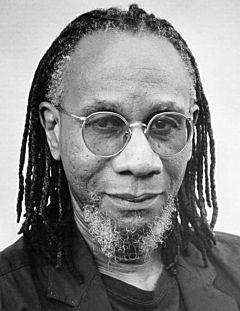
Nathaniel Mackey
Chris Felver Photography
Song of the Andoumboulou: 23
Nathaniel Mackey
Postmodern Culture v.5 n.3 (May, 1995)
(....)
gone, hovered, book, if it
was a
book, thought wicked with wing-stir,
imminent sting... It was the book
of having once been there we
thumbed, all wish to go back
let go, the what-sayer,
farther
north, insisting a story lay
behind the story he complained he
couldn't begin to infer...
What
made him think there was one
we wondered, albeit our what
almost immediatelv dissolved as we
came
to a tunnel, the train we took
ourselves to be on gone up in
smoke, people ever about to get
ready, unready, run between what,
not-what.
And were there one its name was
Ever After, a story not behind but in
front of where this was, obstinate
"were," were obstinate so susceptible,
thin
etic itch, inextricable
demur
Beginningless book thought to've
unrolled endlessly, more scroll
than book, talismanic strum.
As if all want were in his holding
a note only a half-beat
longer,
another he was now calling love
a big rope, sing less what
he did than sing, anagrammic sigh ...(more)
The "Mired Sublime" of Nathaniel Mackey's Song of the Andoumboulou
Paul Naylor Postmodern Culture
The ontogeny and phylogeny of Mackey's song of the Andoumboulou
Matthew A. Lavery
African American Review, Winter, 2004
_______________________

Ulysses
1947
Robert Motherwell
January 24, 1915 – July 16, 1991
_______________________
Pascalian Meditations
Pierre Bourdieu
Translated by Richard Nice
aaaarg - free reg. req.
Critique of Scholastic Reason
Postscript I
Impersonal Confessions
(....)
I shall speak very little about myself, the singular self, in any case, that Pascal calls 'hateful'. And if I nonetheless never cease to speak about myself, it will be the impersonal self that the most personal confessions pass over in silence, or refuse, on account of its very impersonality. Paradoxically, perhaps nothing nowadays appears more hateful than this interchangeable self that is revealed by the sociologist and socio-analysis (and also, though it is less apparent, and so better tolerated, psychoanalysis). Whereas everything prepares us to enter the regulated exchange of narcissisms, of which a certain literary tradition has established the code, the effort to objectify the 'subject' which we are led to think universal because we have it in common with all those who are the product of the same social conditions encounters violent resistance. Anyone who takes the trouble to break with the self-indulgence of nostalgic evocations in order to make explicit the collective privacy of common experiences, beliefs and schemes of thought, in other words some of the unthought which is almost inevitably absent from the sincerest autobiographies because, being self-evident, it passes unnoticed and, when it surfaces in consciousness, is repressed as unworthy of publication, is liable to offend the narcissism of the reader who feels objectified, despite himself,by proxy and, paradoxically, all the more cruelly the closer he is to the author of the work of objectification - unless the catharsis induced by the awakening of consciousness is expressed, as sometimes happens, in liberated and liberating laughter.
_______________________
Roger Gathman offers some translations from Balawou (Haitti)
news from the zona
There is a fantastic site, Balawou, that has been publishing reportage and comment since the beginning. Sometimes I get the feeling that for the Americans and the English, the earthquake in Haiti was the equivalent of one hundred thousand house flies being crushed – not the kind of news that should interrupt one’s day, or be allowed to cross one’s blog, especially if you have made an important Deleuzian analysis of Lady Gaga. I however am such an old fashioned humanist that I feel all pinched in my human parts at the hundred thousand crushed houseflies. I'm even questioning the “leftist” credentials of the important Deleuzian analysis of Lady Gaga. I must be going senile....(more)
_______________________
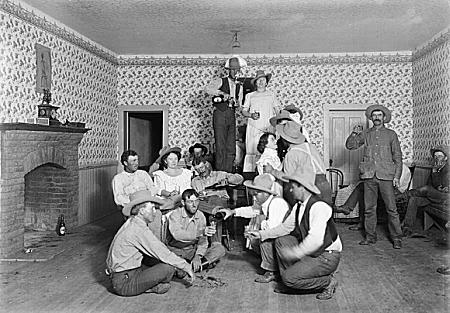
Pouring a few drinks
in a room with flowered wallpaper
1908-1912
Erwin E. Smith
(1886-1947)
Cowboy Photographer
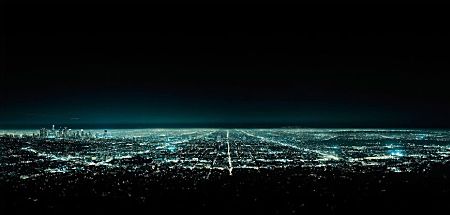 L.A.
sacred and secular
David Burdeny
via Tim Atherton
_______________________
When I Heard the Learn'd Astronomer
Walt Whitman
When I heard the learn'd astronomer,
When the proofs, the figures, were ranged in columns before me,
When I was shown the charts and diagrams, to add, divide, and measure them,
When I sitting heard the astronomer where he lectured with much applause in the lecture-room,
How soon unaccountable I became tired and sick,
Till rising and gliding out I wander'd off by myself,
In the mystical moist night-air, and from time to time,
Look'd up in perfect silence at the stars.
.....................................................
Writing into Whitman
Robert Kelly
When I wanted to learn when poetry happens
and what good it does in cities, Death’s own greenhouses,
or in the army’s killing fields, I heard a voice
left over from my childhood
when I still believed the things I learn’d
were true and I wanted to be an astronomer, an alchemist,
to summon friends out of the sky who would come to me,
when I hungered for the proofs of love
revealed in how the figures of desire behaved
who were ranged in columns of women and men before me,
when I was shown the beautiful entanglements
of the ordinary, words you could trip over,
how you could drown in maps and sea charts and
climb up the diagrams of geometry to add, divide and
actually make love with angels I could try to measure
while I tried to make them aid me,
when I saw them sitting there above the world
and heard the astronomer where he busily lectured
in my heart with much confidence
about the eternal animals aloft that feed on all our dying,
our death rattles sound like applause to them,
while we in the lecture room of cathedrals praise them –
...(more)
rk-ology
Robert Kelly's new website
_______________________
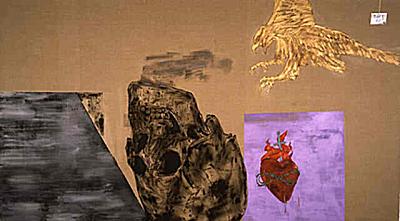
Times Up
1997
Leon Golub
(January 23, 1922 - August 8, 2004)
_______________________
The Trouble with Corporate Personhood
Freedom of Speech for a Fiction
Christopher Ketcham
.....................................................
Be prepared for those poor dumb manipulated bastards, the Tea Partiers, to have a glorious few years as the front men as the corporations that bankroll them slowly unroll their total control of our political system. And then be prepared to watch them be banished, maybe outlawed, when a few of the brighter ones suddenly realize that the corporations have made them the Judas Goats of American Freedom.
U.S. Government For SaleKeith Olbermann
Be prepared, then, for the reduction of taxes for the wealth, and for the corporations, and the elimination of the social safety nets for everybody else, because money spent on the poor means less money left for the corporations.
Be prepared, then, for wars sold as the "new products" which Andy Card once described them as, year-after-year, as if they were new Fox Reality Shows, because Military Industrial Complex Corporations are still corporations. Be prepared, then, for the ban on same-sex marriage, on abortion, on evolution, on separation of church and state. The most politically agitated group of citizens left are the evangelicals, throw them some red meat to feed their holier-than-thou rationalizations, and they won't care what else you do to this corporate nation.(....)
Maybe it won't be this bad. Maybe the corporations legally defined as human beings, but without the pesky occasional human attributes of conscience and compassion maybe when handed the only keys to the electoral machine, they will simply not re-design America in their own corporate image.
But let me leave you with this final question: After today who's going to stop them?...(more)
.....................................................
Money is freedom. Money is free speech. The more money you have the more freedom and free speech and political power, and the more justice you can buy. So we the people live Wealth Bondage and wave our flags with delight as our children, mostly the poor, go off to war to advance Freedom. There is good reason that the phrase social justice is now taboo. It reminds us of an era when ordinary people stood up for their rights as citizens, each of us the equal of any corporation under law. We don't, can't, won't assert our rights in mounting protests, and now we pay the price that disorganized patsies always play when concentrated power takes their measure.
- gift hub
_______________________
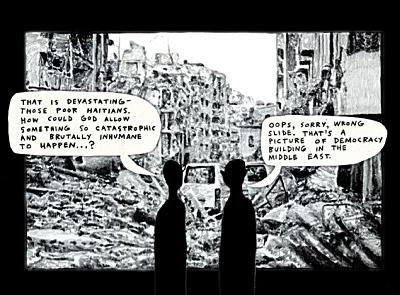
Love and Haiti
Mr. Fish
_______________________
Why Did We Focus on Securing Haiti Rather Than Helping Haitians?
Here are two possibilities, neither of them flattering.
Ben Ehrenreich
_______________________
Securing disaster:
The US repeats past mistakes in Haiti
Peter Hallward
Haiti is the only country where slaves won their own independence, in a war that left a third of the population dead and the economy in ruins. Today it is not only one of the poorest countries in the world, it is also one of the most polarised and unequal – in terms of wealth as well as access to political power. A small clique of rich and well-connected families continues to dominate the country and its economy, while the vast majority of the population live on less than $2 a day.(....)
the strategy of the Haiti’s little ruling class has been to redefine political questions in terms of “stability” and “security”, and in particular the security of property and investments. Mere numbers may well win an election, but as everyone knows, only an army is equipped to deal with insecurity. The well-armed “friend of Haiti” that is the United States knows this better than anyone else.(....)
in the wake of disaster, the imperatives of stability again won out. Military flights have taken priority over humanitarian shipments, while US commanders have trumpeted fears of popular unrest as their chief concern, despite widespread reports of patience and solidarity on the streets.(....)
This is the fourth time that US troops have landed in Haiti since 1915. Although each invasion has taken a different form and responded to a different pretext, all four have been expressly designed to restore ‘stability’ and ‘security’ to the island. Earthquake-prone Haiti must now be the most thoroughly stabilised country in the world. Thousands of additional foreign security personnel are already on their way, to guard the teams of foreign reconstruction and privatisation consultants who in the coming months are likely to usurp what remains of Haitian sovereignty.
Perhaps some of these guards and consultants will help their elite clients achieve another long-cherished dream: the restoration of Haiti’s own little army. And perhaps then, for a short while at least, the inexhaustible source of ‘instability’ in Haiti – the ever-nagging threat of popular political participation and empowerment – may be securely buried in the rubble of its history....(more)
_______________________
Dumping Ground of the Caribbean
Haiti and Toxic Waste
Mitchel Cohen
_______________________
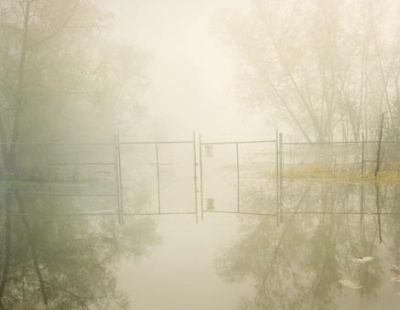
Hazardous Waste Containment Site
Dow Chemical Corporation
(1998)
Richard Misrach
1 2 3 Chronologies: An Interview with Richard Misrach
Seesaw Magazine
_______________________
COLLeGIUM Volume 5
Writing in Context: French Literature, Theory and the Avant Gardes
.....................................................
Dada in Context [pdf]
Henri Béhar
Translation: Annette Tomarken
abstract
The superb Dada exhibition held at the Pompidou Centre in 2005 (and after in Washington) inspired a large number of publications that I would like to go over and discuss here. In the preface to his recent illustrated guide, Gérard Durozoi states that ”Rebellious avant-garde movements challenge the notion of progress, concerning themselves more with meaning than with form. They consider that their potential for subversion cannot be reduced to a narrowly political engagement, which may indeed involve certain individuals, but not the movement as a whole, and that from this point of view the misfortunes of surrealism should provide a clear warning”.1 Following the example of Isidore Ducasse, we could reverse each of these propositions and find them equally apt. If we consider merely the overall thrust of the assertion, we find that this critic contrasts an apolitical Dadaist movement with the tendency of early Surrealism (after Futurism) to engage firmly in politics during its “période raisonnante”. This view would give us, on the one hand, a pure white dove (or almost pure, subject to the removal of a few elements, contaminated by politics in individual cases, free from any form of engagement), and, on the other hand, an impure group, permanently compromised by a youthful error, its involvement with the Communist Party. "... everything shows that most Dadaists were immersed in the culture of anarchism, from Hugo Ball translating Bakunin to Max Ernst, Theodor Baargeld, Julius Evola, Marcel Duchamp and Picabia reading Stirner; from Julius Heuberger, printer of the “Dada” review in Zurich, to Man Ray, the brilliant American Jack-ofall trades; from the painter Hans Richter’s links to the Zurich anarchist group to the anarchist tendencies of Berlin Dadaism (Hausmann, Baader, Huelsenbeck). Thirty years after the Zurich demonstrations, Tristan Tzara, who had himself learned of the anarchist movement in Bucharest, believed in this idea: ”It is obvious that the anarchistic nature of Dadaism, together with the idea of a moral absolute that the movement placed beyond any practical contingency, was bound to keep the Dadaists away from political struggles”.
And even beyond this original influence, which derived chiefly from the great thinkers of Anarchy (Stirner, Bakunin), the fundamental attitude of the Dadaists derives from this doctrine. A contemporary drew the following portrait of Hugo Ball: ”What good were logic, philosophy and ethics in the slaughterhouse that Europe had now become? Intelligence was bankrupt. Every day provided new examples: with the help of language, it was so easy to justify this carnage. But to try to fight it with words and sentences seemed at first sight naïve and impossible. Dadaism was therefore an attempt to destroy the tools that materialism had seized to defend its universe”."
COLLeGIUM
Studies across Disciplines in the Humanities and Social Sciences Helsinki: Helsinki Collegium for Advanced Studies
_______________________
Bush in Drag: Sarah Palin and Endless War
Kathy Ferguson
borderlands
Rethinking Politics
Borderlands Volume 8 Number 3, 2009
_______________________
The Posthuman Dada Guide: Tzara and Lenin Play Chess
Andrei Codrescu
Reviewed by Grant Mandarino
Known for his whimsical prose and probing wit, Codrescu brings to the subject of Dada a voice that nearly replicates the movement's own brand of sardonic hilarity. He shares the Dadaists' love for puns, rowdy behavior, and irrational thought. Indeed, Codrescu suggests that we are in need of a Dada renaissance. As he claims near the beginning: "It is the thesis of this book that posthumans lining the road to the future ... need the solace offered by the primal raw energy of Dada and its inhuman sources". "Posthuman" is defined as "a human who has put nature ... between parentheses". This "raw energy of Dada", Codrescu argues, provides a welcome antidote to the increasing "virtuality" of today's world, which more and more reprograms nature and humanity according to an insidious logic. Codrescu refers to the book as a "guide," with sections divided according to subject heading (alphabetized, no less) rather than stand-alone chapters. Thus, in place of a conventional narrative Codrescu presents a series of thematic expositions, woven from choice anecdotes and amusing personal reflections, that function more like a mode d'emploi than a standard historical account. Codrescu draws heavily from the latest academic studies of Dada, particularly Thomas Sandqvist's research on the Romanian members of the group and the spate of recent books exploring the female figures of Dada, women such as the Baroness Elsa von Freytag-Loringhoven, Mina Loy, and Emmy Hennings (Hannah Höch, equally represented in this new literature, is largely absent from Codrescu's book)....(more)
_______________________
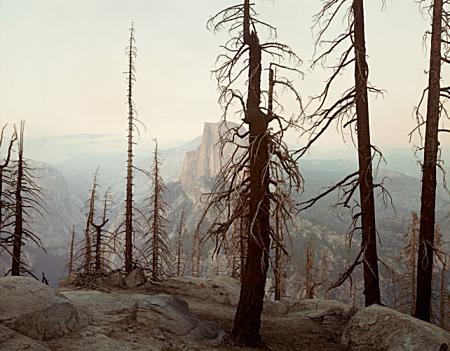
Yosemite
(burnt forest & half dome)
Richard Misrach
1988

photo - mw
_______________________
from Genji Monogatari
Mark Young
X. The Sacred Tree
Affirmation blankets, New World
flags, talismen, Native American
flutes, dowsing rods, statues for the
musically inclined among you. &
for jam band fans who are there
more for the event than the music
an automated teller machine
waits to eat the nine nuts of
poetic wisdom dropped into
the sacred pool from the hazel tree
growing beside it. The Russian
guy sips his coffee from a poly-
styrene cup, mentally mistranslating
that Phish song which reveals
Colonel Forbin's deep feelings
for Tela. She doesn't let go of his
hand. He can't let go of his terminal
cancer, beautifully embroidered on
100% linen. The pond is frozen
over. There is nothing outside
the text. Genji's visits, never
frequent, have stopped altogether.
...(more)
moira - volume 11, issues 3 & 4
Mark Young is editor of Otoliths
_______________________
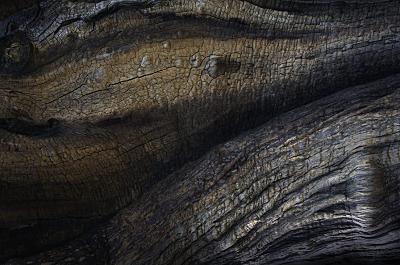 tree skin
Daniel Freytag
via rileydog
_______________________
Lecture on Haiti
Frederick Douglass
Chicago, Jan. 2d, 1893
via Denise at New Pages
Haiti - a history of intervention, occupation and resistance
Andrew N Flood
Covering Haiti: When the Media Is the Disaster
Rebecca Solnit
The Militarization Of Emergency Aid To Haiti
Michael Chossudovsky
global research

The Dead Can Still Dance
Yun-Fei Ji
2006
James Cohan Gallery
_______________________
Canada's Haiti: The Dirty Past And The Dirty Future
Robin Mathews
As I write “countries with a key interest in Haiti [Globe and Mail, Jan 19 10 A12] will meet in Montreal next week to discuss “rebuilding the devastated island nation”. Countries with a “key interest” are the countries which have oppressed the Haitian people and intend to continue doing so – especially Canada, the U.S., and France.
This will be the second meeting in Canada – about Haiti.
(....)
Aid will go to Haiti, and the people will be helped back to their status as exploited slave labour for the profit of foreign corporations - and U.S. policy for the region.
(....)
Aid is rushing to Haiti. Aid? What kind of Aid? Troops, troops, and more troops. For “security” we are told (even as reporters tell us there is almost no security problem). The troops are, though, genuinely being sent for security reasons – to assure the security of the power of foreign countries over Haiti....(more)
_______________________
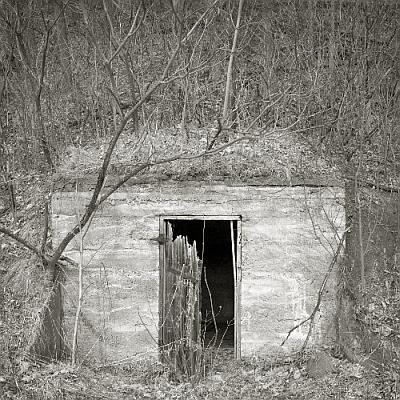
door
Beth Dow
_______________________
Camille Martin in moria
Adam Fieled
Stoning the Devil
What I at first dimly suspected has now been affirmed; there is as much vitality, craft, and genuine art being transmitted via the Web as there is being released via print journals. Martin's sonnets deserve a closer look.
(....)
comatose in paradise, but happy, happy
feet! is this where i want to go? thrust
into an age unfavorable to being
a guest in one's own home? the guest
so evolved its dying smile causes
offspring to birth on the spot? progeny
doomed to fail superbly, like houdini's
fetters? is this what i want? am i lucky to think
i am? these twittering birds have nothing
on the silence of magicians from the grave. someday
paradise will be thought savage. did rain fall
because i wanted to write a poem about love,
causing significant damage to blameless power?
here comes the bus, fool. is that it?
(....)
Martin's edge has more to do with the conventions of post-modernity; of irony that trumps earnestness, cynicism that trumps avowal, and humor that trumps pathos.
(....)
It seems that Martin is creating a double parody: of the Romantic conventions of the sonnet form, and of herself using the conventions even as she trashes them. These "twittering birds" are not meant to be pretty; "doomed progeny" tells you what you need to know about the poem's subversive intentions, and mordant wit. With poems of this depth and quality being published on the Net, I feel that it is time for Net publishers to get up, stand up in the best Marley-ian fashion, and declare their parity with any print counterparts. It seems to me that no enlightened poet could fail to miss the implications of a post like this, or the previous posts on Aaron Belz and everyone else. Print hegemony is a thing of the past; we now boast both quality and quantity. The idea that the Net is for amateurs is reductive and, frankly, rather fatuous. ...(more)
Camille Martin 1 2 3
_______________________
 dialogue
Willi Baumeister
(January 22, 1889 - August 31, 1955)
_______________________
from
Letters of Resignation
Clayton Couch
A Sonnet for the Mathematically Challenged
Write to the null set. They jiggle in indeterminate postures,
arrow pursuit and fortune. Preset on sphere of lightning,
comedies about gun-totting anger management refugees
whistle robots’ feeding time. A few behavioral modifications;
desertion of techno-progress Protestant project: what is not
a mere sliver of afterlife generates an attack of indigestion.
If the wilderness weren't doubled over, we'd claim cavity.
The cute jabber holy drama; these cares only matter to fools.
There sleeps an exhausted poseur for the old tribal evidence,
a curious all-you-can-eat spiritual buffet, one that does
little to solve the perpetual problems of appetite and desire.
Rather, confront the trick of mystery. Stay loose in certitude,
raw wound. Weather plays a part in the encircling suspicion.
moira e-books
moira poetry journal
edited by William Allegrezza
Mark Young is editor of Otoliths
_______________________

Ruts
Beth Dow

Kate McGarrigle
1946 – 2010
heads up from One Eyed Crow "She departed in a haze of song and love surrounded by family and good friends. She is irreplaceable and we are broken-hearted."
- Anna McGarrigle
Kate and Anna McGarrigle, musical sisters
CBC Archives

Dink’s Song aka Fare Thee Well
Kate & Anna McGarrigle,
Bruce Cockburn,
Martha Wainwright, Rufus Wainwright,
Chaim Tannenbaum, May 3/09
vimeo
_______________________
Earthquake
Aimé Césaire
Translated, from the French, by Paul Muldoon
_______________________
Presiding Spirits: On the Train With Bill and Basho
Philip Gross
On another level, I was on that train with Basho, that calm, wry, restless traveller and haiku master from seventeenth century Japan. He was not a tourist, any more than I was, passing Goole; he was a dedicated journeyer through ordinary places, and his haibun journals like The Narrow Road to the Deep North are the most organic blend I’ve seen of prose and poetry, reportage and reflection. He was a man of Zen, whose ideal of haiku was to lose oneself in the object so that, for an instant, you are it: the ego disappears.
Darkening waves –
cry of wild ducks,
faintly white.
This is Basho, in Lucien Stryk’s ruthlessly spare translation. Every school child today knows that haiku have seventeen syllables, but this version makes no attempt to reproduce that count in English – a language so different in structure and sound from Japanese that the form cannot be carried over arithmetically. What Stryk asserts is the spirit of haiku – in particular the ‘light touch’, karumi, which also connotes the specialness of ordinary things. The verse is rich with evocation and a teasing synaesthesia (is it the ducks, or their cry, which is faintly white?) but it is also concerned with the liminal moment, when something steps over into not being. It is not only the ducks that disappear but the perceiver’s eye (and I).
A Prospect Of Goole records, I hope accurately, the way impressions arrive in an extraordinarily flat landscape, especially when framed by the movement of a train. The flurries of metaphor and simile aren’t a tactic of estrangement: the experience was that strange. All the images, I notice, are of distance, in time or in space, but this was no plan I had made in advance. I’m discovering things. Rereading / revising the poem while writing these reflections is turning me into the Reader whose responses (says the theorist in my brain) ultimately make the poem. And I sense Basho nodding in agreement. Haiku of all verse most insist on leaving space for the reader to insert their own associations and interpretations. The three-line form helps this: for English readers there is still a default setting for the couplet or the four-line verse, so haiku feel somehow indefinably unfinished. This is in the spirit of the thing....(more)
Magma via the page
_______________________
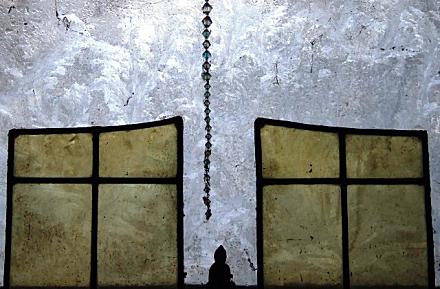
Ice Flowers
Kirsten Zwijnenburg
_______________________
Underground
Jason Myers
I.
I buried my words in a field in Florida.
There are no fields in Florida.
There’s only ocean and wounds of old elections and lost love.
Your body is preserved in Egyptian cotton.
Let me be your urn and carry you around the world for fifteen years
until the right wind dreams into the silver lips
of your remains and turns you into every word
I wanted to say, sunlight scattering its gold
and copper coins. Everything’s free now.
II.
Deep into the earth I walked without water, without salt.
I was salt-water, seven seas, seven sisters, I wondered at the ancient world.
Words of Ovid and James Joyce in the hall leading to the New York Public Library.
Exile of easy winter, I drink lemonade while chrysanthemums
shatter their brittle blue glass and moths envy butterflies.
Color, Bonnard said, is everywhere, but when does it become light?
...(more)
Three Poems
Jason Myers
conjunctions
_______________________
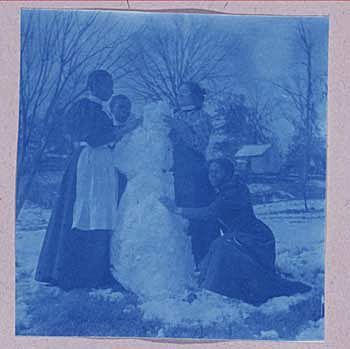
Cyanotypes
Richard Riley
[ca. 1896-1903]
Calhoun Industrial School in Alabama
Founded in 1892, Calhoun was a freedmen's school devoted to industrial education. Classes were offered in agriculture, arithmetic, basketry, Bible study, carpentry, cobbling, cooking, English, geography, mattress making, and sewing.
In addition, Calhoun provided teacher training. Many of its courses were taught by graduates of Virginia's Hampton Normal and Agricultural Institute.
Digital History
_______________________
Starving Memory
Joseph Plumb Martin Un-tells the Story of the American Revolution
William Huntting Howell
There are many ways to tell the story—different personnel, different motive forces, different perspectives on the ultimate outcomes—but the essential plot remains the same. The Revolution fits patterns that we recognize—the flows of conflict and resolution, of call and response, of change over time.
As devoted to such patterns as we are—they allow us to make sense of the past, to forge history from the unfathomable welter of time gone by—we must also recognize their essential artificiality; they are products of historiography, not intrinsic features of the events themselves. And they are not neutral or disinterested: different frames for events lead to different senses of the whole. They make the difference between "Revolution" and "Rebellion," between "freedom fighting" and "terrorism." In thinking about the familiar story of the American Revolution, then, we must follow the poet Amy Lowell and inquire seriously: "What are [these] patterns for?" One answer—increasingly clear in the recent advent of Glenn Beck’s Common Sense, Ron Paul’s anti-tax "Tea Parties" and other right-wing fever-dreams about the late eighteenth century—is that the narrative elegance of the Revolution slots neatly into (or emerges out of) persistent fantasies of American exceptionality. The origin-story works so well—how could it have gone otherwise? How could the existence of the United States not have been logically—if not divinely—ordained? It is a short, bright line from conventional narrative histories of the Revolution to the largely triumphalist foreign and domestic policy of most of the last two centuries; varieties of American exceptionalism have provided cover for everything from the continuation of racial slavery, Indian removal, and anti-immigrant riots to the Cold War and the Bush Doctrine.
But not every story of the Revolution fits so neatly into such providentialist and heroic-nationalist narratives of the Founding. Joseph Plumb Martin’s Narrative of Some of the Adventures, Dangers, and Sufferings of a Revolutionary Soldier, first published in Hallowell, Maine, in 1830, offers both a counter-record of the facts of the War and a counter-method for relating them....(more)
Common-Place · VOL. 10 · NO. 02 · January 2010

Seasons
Artavazd Peleshian
(1975)
28 min
UbuWeb: Film & Video
_______________________
from Open Box
Carla Harryman
(....)
Along whose banks the artists kissed
And gave alms of hieroglyphs
Calligraphies of disorder
Much needed
In one place, here
Not in another, there
The war in sand there
Kisses the dead river here
Nothing a poem can erase
My lands remarks
Much needed
Sands dead river
The writer of this poem
Shining it up had not thought
To be an American
Polishing
¶
A European not-me
Or of the Middle East or Mexico
Sanding away
Each disappearing within an other
Less fabric
For the dress of nation
A fashionable plan prevails
Roughed thin masculinity
Except in the highest places
You don’t wanna go there
But I do and won’t
Speak to the slayers
No singularity can make power
Crowd gathers fragments
Rough it up
Think first
...(more)
_______________________
Disaster Capitalism Headed to Haiti
Steve Lendman
The Right Testicle of Hell: History of a Haitian Holocaust
Greg Palast
_______________________

Gilles Deleuze
January 18, 1925 - November 4, 1995
The Event in Deleuze
Alain Badiou
translated by Jon Roffe
Rhizomatic Bodies: Thinking through the Virtualities of Control Societies
David V. Ruffolo
Deleuze and Guattari resources
compiled by Charles J. Stivale
Capitalism, flows, the decoding of flows, capitalism and schizophrenia, psychoanalysis, Spinoza.
Capitalism: A Very Special Delirium
Gilles Deleuze and Felix Guattari
_______________________
my software mission
Maged Zaher
jacket
(....)
this is not the same as being free
from theory’s nagging despair
we owe our hunger to the map’s persistence
(which didn’t prevent us from participating
in new terminologies)
this was where rigor met cuteness
& told bedtime stories all morning
basically, we were overwhelmed with symbols
so we escaped from the city’s downtown
where i bought my first dictionary
& looked up half the words in fear
of never knowing the other half
the neon of the same city carried me —
like a lame prophet — to its outstanding coffee shops
yes, mine is a standard story of time spent the
worst way, although theory books
gave me a reason to be happy
later i grew a beard & wept for
all the surplus value generated over history
...(more)
Four Poems
Maged Zaher exquisite corpse
Maged Zaher at PennSound
_______________________

Sebastian Mölleken
via Joerg Colberg
_______________________
An Intermedia With 2 Billion Screens Peering Into It
Kevin Kelly
edge
My certainty about anything has decreased. Rather than importing authority, I am reduced to creating my own certainty — not just about things I care about — but about anything I touch, including areas about which I can't possibly have any direct knowledge . That means that in general I assume more and more that what I know is wrong. We might consider this state perfect for science but it also means that I am more likely to have my mind changed for incorrect reasons. Nonetheless, the embrace of uncertainty is one way my thinking has changed.
Uncertainty is a kind of liquidity. I think my thinking has become more liquid. It is less fixed, as text in a book might be, and more fluid, as say text in Wikipedia might be. My opinions shift more. My interests rise and fall more quickly. I am less interested in Truth, with a capital T, and more interested in truths, plural. I feel the subjective has an important role in assembling the objective from many data points. The incremental plodding progress of imperfect science seems the only way to know anything. (....)
This waking dream we call the Internet also blurs the difference between my serious thoughts and my playful thoughts, or to put it more simply: I no longer can tell when I am working and when I am playing online. For some people the disintegration between these two realms marks all that is wrong with the Internet: It is the high-priced waster of time. It breeds trifles. On the contrary, I cherish a good wasting of time as a necessary precondition for creativity, but more importantly I believe the conflation of play and work, of thinking hard and thinking playfully, is one the greatest things the Internet has done.
In fact the propensity of the Internet to diminish our attention is overrated. I do find that smaller and smaller bits of information can command the full attention of my over-educated mind. And not just me; everyone reports succumbing to the lure of fast, tiny, interruptions of information. In response to this incessant barrage of bits, the culture of the Internet has been busy unbundling larger works into minor snippets for sale. Music albums are chopped up and sold as songs; movies become trailers, or even smaller video snips. (I find that many trailers really are better than their movie.) Newspapers become twitter posts. Scientific papers are served up in snippets on Google. I happily swim in this rising ocean of fragments....(more)
_______________________
The Internet as Playground and Factory: A Conference on Digital Labor
Ulises A. Mejias
Afterimage
_______________________
There are many acts of destruction for which the Bush years are rightly reviled – the illegal invasions, the defiant defences of torture, the tanking of the global economy. But the administration's most lasting legacy may well be the way it systematically did to the US government what branding-mad CEOs did to their companies a decade earlier: it hollowed it out, handing over to the private sector many of the most essential functions of government, from protecting borders to responding to disasters to collecting intelligence. This hollowing out was not a side project of the Bush years, it was a central mission, reaching into every field of governance. And though the Bush clan was often ridiculed for its incompetence, the process of auctioning off the state, leaving behind only a shell – or a brand – was approached with tremendous focus and precision.
- Naomi Klein
_______________________

Muromtsev dacha
last historical wooden house of Moscow's Tsaritsino district
Photo by Mat’-Ekhidna
The house that did not exist
Poemas del río Wang
_______________________
Often I Am Permitted to Return to a Meadow
Robert Duncan
as if it were a scene made-up by the mind,
that is not mine, but is a made place,
that is mine, it is so near to the heart,
an eternal pasture folded in all thought
so that there is a hall therein
that is a made place, created by light
wherefrom the shadows that are forms fall.
Wherefrom fall all architectures I am
I say are likenesses of the First Beloved
whose flowers are flames lit to the Lady.
She it is Queen Under The Hill
whose hosts are a disturbance of words within words
that is a field folded.
It is only a dream of the grass blowing
east against the source of the sun
in an hour before the sun's going down
whose secret we see in a children's game
of ring a round of roses told.
Often I am permitted to return to a meadow
as if it were a given property of the mind
that certain bounds hold against chaos,
that is a place of first permission,
everlasting omen of what is.
PoemTalk 27: Robert Duncan's "Often I Am Permitted to Return to a Meadow"
_______________________
No Better than We Should Be, concluded
Ray Davis
Dorothy J. Hale asks "Is there an anti-humanist or post-humanist way of conceptualizing the emotions of the engaged novel reader as a non-colonizing translation of social difference into a positive basis of community and political reform?" Which suggests another question: Is there any way to turn a quest for an anti-humanist or post-humanist way of conceptualizing the emotions of the engaged novel reader as a non-colonizing translation of social difference into something anyone outside Hale's discipline would characterize as ethical action? Such a turn is a new twist on an old mat, a "responsibility to the text" which indefinitely defers responsibility to human beings. It makes me feel something akin, I think, to the loathing some Quakers felt toward Nixon. Like we're pissing away what's important in the name of what's important. ...(more)
_______________________
To Roosevelt
Rubén Darío
Nicaraguan poet
January 18, 1867 - February 6, 1916
(....)
But our own America, which has had poets
since the ancient times of Nezahualcóyolt;
which preserved the footprint of great Bacchus,
and learned the Panic alphabet once,
and consulted the stars; which also knew Atlantic
(whose name comes ringing down to us in Plato)
and has lived, since the earliest moments of its life,
in light, in fire, in fragrance, and in love--
the America of Moctezuma and Atahualpa,
the aromatic America of Columbus,
Catholic America, Spanish America,
the America where noble Cuauthémoc said:
"I am not in a bed of roses"--our America,
trembling with hurricanes, trembling with Love:
O men with Saxon eyes and barbarous souls,
our America lives. And dreams. And loves.
And it is the daughter of the Sun. Be careful.
Long live Spanish America!
A thousand cubs of the Spanish lion are roaming free.
Roosevelt, you must become, by God's own will,
the deadly Rifleman and the dreadful Hunter
before you can clutch us in your iron claws.
...(more)
Poems By Ruben Dario
translated by Lysander Kemp
Rubén Darío - eleven poems translated by Salomón de la Selva
_______________________

The House of Hysteria
Clarence John Laughlin
1941
Clarence John Laughlin, Regionalist Surrealist
Lewis Kachur
Journal of Surrealism and the Americas
Vol 2, No 2 (2008)
Special Issue on Photography
Haunter Of Ruins
Jared Ragland on Clarence John Laughlin at offtheorange, blog of the Corcoran College of Art + Design Fine Art Photography Class of 2011
Haunter of Ruins: The Photography of Clarence John Laughlin
amazon
_______________________
"Keep watch over absent meaning"
- Maurice Blanchot, The Writing of Disaster

January thaw
Brockville
photo - mw
_______________________
After Rain
P.K. Page
Whoever has no house now will never have one.
Whoever is alone will stay alone
Will sit, read, write long letters through the evening
And wander on the boulevards, up and down...
-
Rainer Maria Rilke, Autumn Day
Its stain is everywhere.
The sharpening air
of late afternoon
is now the colour of tea.
Once-glycerined green leaves
burned by a summer sun
are brittle and ochre.
Night enters day like a thief.
And children fear that the beautiful daylight has gone.
Whoever has no house now will never have one.
It is the best and the worst time.
Around a fire, everyone laughing,
brocaded curtains drawn,
nowhere-anywhere-is more safe than here.
The whole world is a cup
one could hold in one's hand like a stone
warmed by that same summer sun.
But the dead or the near dead
are now all knucklebone.
Whoever is alone will stay alone.
Nothing to do. Nothing to really do.
Toast and tea are nothing.
Kettle boils dry.
Shut the night out or let it in,
it is a cat on the wrong side of the door
whichever side it is on. A black thing
with its implacable face.
To avoid it you
will tell yourself you are something,
will sit, read, write long letters through the evening.
...(more)

P.K. Page
(November 23, 1916 — January 14, 2010)
bibliography
The constant writer
Remembering the life and lessons of poet P.K. Page
Rosemary Sullivan
_______________________
No Better than We Should Be
Ray Davis
pseudopodium
Literary criticism's "cognitive turn" and "evolutionary turn" have introduced oversimplifications, misunderstandings, and the most puerile of observations. The ethical turn operates at a higher level entirely. Close reading, introspection, historical and biographical tidbits, the canonical vocabulary of Theory, and consumer studies from surveys or labs — all the proven tools of the critical trade remain at reach within a sturdy and compelling — perhaps even compulsory — frame.
Why do I so loathe the trend, then? Why does bile choke even the expression of my loathing?
And why should you care?
Ethically-turned critics promise inestimable rewards if you'll take time to closely attend the articulation of a spiritual struggle, no matter how privileged the protagonist or how idiosyncratic the circumstance. They describe it almost as your duty.
Friends, I fight for your right to ignore me. ...(more)
Parts 2, 3 and 4.
_______________________

Secretarial pool at work
New York World's Fair
(1939-1940)
_______________________
The Stenographers
P.K. Page
1946
(....)
Their climates are winter and summer--no wind
for the kites of their hearts--no wind for a flight;
a breeze at the most, to tumble them over
and leave them like rubbish--the boy-friends of blood.
In the inch of the noon as they move they are stagnant.
The terrible calm of the noon is their anguish;
the lip of the counter, the shapes of the straws
like icicles breaking their tongues, are invaders.
Their beds are their oceans--salt water of weeping
the waves that they know--the tide before sleep;
and fighting to drown they assemble their sheep
in columns and watch them leap desks for their fences
and stare at them with their own mirror-worn faces.
In the felt of the morning the calico-minded,
sufficiently starched, insert papers, hit keys,
efficient and sure as their adding machines;
yet they weep in the vault, they are taut as new curtains
stretched upon frames. In their eyes I have seen
the pin men of madness in marathon trim
race round the track of the stadium pupil.
...(more)
_______________________

type-setting room
1876
NYPL Digital Gallery
_______________________
The Unforgiven Country Cries Out
Chris Floyd
The relentlessly maintained, deliberately inflicted political and economic ruin of Haiti has a direct bearing on the amount of death and devastation that the country is suffering today after the earthquake. It will also greatly cripple any recovery from this natural disaster. As detailed below, Washington's rapacious economic policies have destroyed all attempts to build a sustainable economy in Haiti, driving people off the land and from small communities into packed, dangerous, unhealthy shantytowns, to try to eke out a meager existence in the sweatshops owned by Western elites and their local cronies. All attempts at changing a manifestly unjust society have been ruthlessly suppressed by the direct or collateral hand of Western elites.
The result? Millions of people -- weakened by hunger, deprivation, malnutrition, disease -- living jammed together in precarious, substandard housing. A lack of the physical, financial and civic infrastructure needed to support a decent life in ordinary times -- and to provide proper assistance, and a strong framework for rebuilding, when disaster strikes. Even a far lesser earthquake than the one that struck this week would have caused an unconscionable amount of unnecessary suffering in a nation that has been as ruthlessly and deliberately throttled as Haiti.
With Hurricane Katrina, we saw how callously and unjustly America's elites reacted to the destruction of one of their own cities. Politically connected Mississippi millionaires got prompt and copious assistance -- while many New Orleans natives are still refugees, scattered across the country years after the flood. And this in a nation in which the infrastructures -- though rapidly rotting from the corruption of greed and militarism -- are still strong. What hope then for Haiti?
Yes, there will now be a great outpouring of immediate aid, as there always is after any spectacular disaster. And of course, this is laudable, and I encourage anyone who can to contribute what they can to these efforts. But unless there is a sea-change in American policy, unless there finally comes an end to the curse that has been laid on Haiti -- not by God, or by the Devil, but by the hard hearts of elites following blindly in the cruel traditions of their predecessors -- then this flurry of caring and attention will soon give way again, as it has always done, to callous disregard, brutal repression and inhumane exploitation.
The tale of these cruel traditions -- and the "continuity" with them that Obama has already displayed -- does not augur well for such a change. But as that wise man, Edsel Floyd, always says, we live in hope and die in despair. And such a hope for Haiti is worth holding onto, and working toward.
At the same time, hope must not be blind; you have to acknowledge the grim realities in order to know just what you're up against. So let's take a long, hard look....(more)
_______________________
Palin, Fox, 'Jesus on Acid' and the End of the World
The unconnected dots of Alaska's superstar and rightwing evangelical/fundamentalist victimhood for politics and profit...
Frank Schaeffer
The momentum toward what amounts to a broad Palin-loving subculture seceding from the union (in order to await "The End") and/or a time when the US government quits taxing us, is irrevocably prying loose a chunk of the American population from both sanity and their fellow citizens. If you think Palin's fans are nuts; they are. If you think the tea baggers are odd; they are. The theology of the "End" is behind both. In the religious version Jesus is on the way. In the "tea bagger" secular version: the US government is the enemy and is the harbinger of doom, collapse and the end....(more)
_______________________
When asked exactly what constitutes being middle class, most typical Americans, which is to say working class Americans, talk in terms of income. Better educated and more erudite Americans mumble some vague litany about college and home ownership, etc., then attach an annual income number about twice as high as the average working mook's. Neither of them ever comes close to a real definition. Nevertheless some 300 million Americans fancy themselves as middle class, chiefly because they: (A) own microwaves and a car with plastic bumpers; and (B) live in perpetual hock to MasterCard and Visa. Debt, stress and insecurity being the only observable characteristics of middle class America, they rally round those things in a show of class solidarity. "Hell no! Our pointless stressful lifestyle is NOT NEGOTIABLE! No goddamned socialist is gonna take away my constitutional right to medical bankruptcy. God bless the middle class!"
-
Joe Bageant
_______________________

photo - mw
_______________________
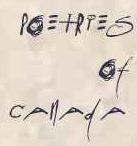
Poetries of Canada
Edited by Jack Kimball & David Bromige
The East Village Poetry Web - Volume Four
Prayer for Geography
Meredith Quartermain
To all who fall
to matter
write the earth
a space of white
break of bread
plates break in relief
write stones cocks cry
to collected waters
or hollow fire of iron.
Eat atmosphere, a garland
sift on a drift
post out the earth's hearth
to horizon and swallow heat
of antipodes
plants ride out in leaves
to mirror oceans
to finger rivers tribulations
smooth away our tombs.
Figures of earth, press out our bodies.
Strange our urge into that which takes stand.
Distribute our loom
work through the scape the seek of air
each ear our forgotten art.
For these are our herdsmen
and without this earth as
risk we have no
right of river hear
our three yonders a sphere
of being of geography to the
ring of ocean above them
the maps antipodean
tenderness in all who fall
to matter who come simply
to throw shadows on the moon's
shifting horizon who
devote constellations to the ends
of the earth wide
from the road of symmetry.
8 poems
Meredith QuartermainMeredith Quartermain at EPC
poems at ditch,
_______________________
The uses of disaster:
Notes on bad weather and good government
Rebecca Solnit
2005
|



 Janus Head
Janus Head

 The Age of Briggs & Stratton
The Age of Briggs & Stratton












































